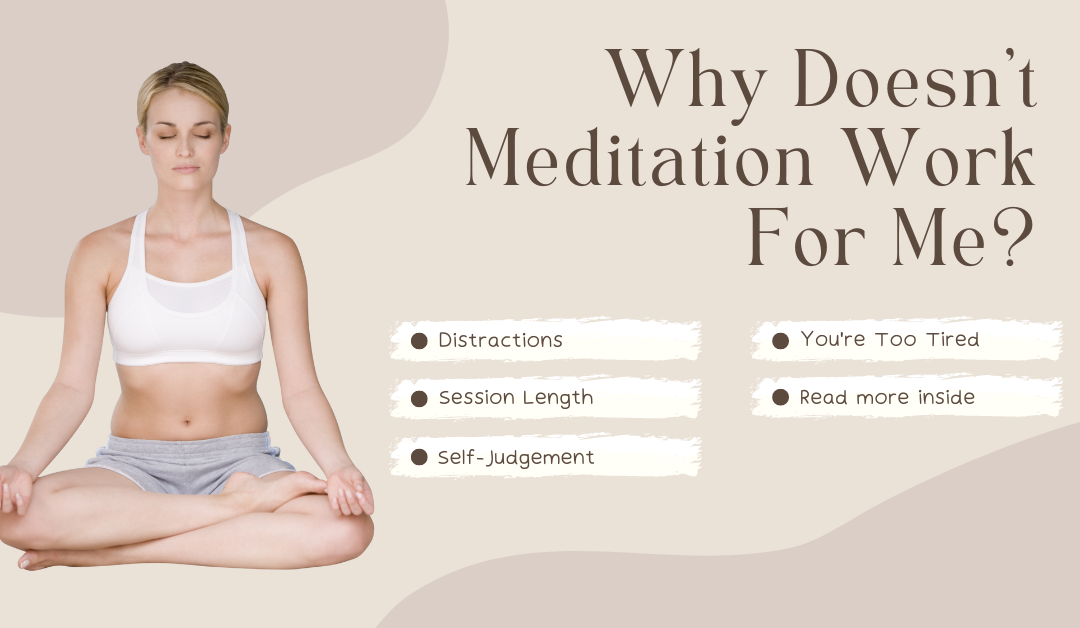Meditation is growing in popularity. People want to experience the mental clarity of meditation and others want to turn to mindful living. However, there’s a growing number of people asking, “why doesn’t meditation work for me?”
For a long time, I was one of these people, too.
After falling asleep or getting stuck in thoughts about everything, I figured that I had an attention disorder. But, then I started delving deeper into the question of why can’t I meditate?
And I found out that meditation is harder than most people think, and it takes time to learn how to meditate. For some people, meditation is boring, and if it’s something that you’re being pushed into and don’t really care about, you might never master meditation.
However, for everyone else that can’t meditate, these few reasons may be holding you back.
What Doesn’t Meditation Work for Me? 7 Reasons Why You Can’t Meditate
1. Your Meditation Space is Filled With Distractions
Meditation apps are helping a lot of people get into meditation. In fact, one report found apps led to a sharp rise in people meditating. However, if you’re trying to meditate and you hear your notifications going off or someone is trying to FaceTime you, it will interrupt your meditation practice.
You need to completely disconnect and have some time for yourself to meditate.
Your daily routine should include 10+ minutes of meditation, where all you have to stay focused on is meditation. This means:
- Let everyone in your home or space know that you need to be 100% alone
- Turn your phone off or on vibrate
- Shut off notifications on your phone, smartwatch or other devices
- Keep animals out of the room – just for your session
It’s true that “focusing” on meditation is a misnomer because you’re supposed to let your mind go into a state of nothingness or bliss, but a lot of people can’t meditate because they’re multitasking.
Multi-tasking works great for a lot of things in life, but it doesn’t work when you practice mindfulness or meditation.

2. Practice Sessions Are Too Long
Remember when I was asking myself why can’t I meditate? My expectations were far too high. If you think you need a 30-minute meditation session or nothing, you’re wrong. Instead, when you’re just starting out, try keeping your meditation to 5 – 10 minutes
When you notice that your mind begins to wander and you’re no longer meditating but thinking about work or worrying about what you’re going to eat for dinner, get up.
Short mediation blocks work best for people questioning why is meditation so hard?
3. Judging Yourself
Focusing on yourself and your own faults is never going to help you meditate. Often, people judge themselves the entire time:
- Am I meditating properly?
- Why doesn’t meditation work for me?
- What’s wrong with me? This should be easy!
- I’m horrible at this.
- I’ll never learn to meditate.
And then, by judging yourself, you begin focusing on all of these negative thoughts and start blocking out the positive thoughts you need to find success in meditation. Instead, make meditation judgment-free and focus on being present.
One method that works very well for remaining in the present when meditating is to focus on your breath.
- Breathe in and focus on the lungs filling
- Breathe out and focus on emptying your lungs fully
- Focus on your chest rising and lowering as you breathe
4. You’re Dead Tired
One mistake that I was personally guilty of when trying regular and candle meditation was thinking that it would be easy to do while lying in bed right before going to sleep. Even if it’s the middle of the day and you’re exhausted, meditating is a bad idea.
Why?
You’ll fall in and out of sleep the entire time. Many meditation teachers call this the “sleepy passive state.” If you’re really tired, once you close your eyes and let your mind wander, you’ll start dozing off.
A better idea is to:
- Meditate first thing in the morning, or
- Meditate at a time when you’re wide awake
If you exercise, you may find that you’ll have a much easier time meditating after your workout. Find a good time to meditate and stick to it.
5. Practicing Inconsistently
Meditation is a lot like anything else in life: it takes practice. If you meditate once every six months, you’re going to start at square one every time. The ideal way to begin meditating is:
- Start in small meditation blocks of just five minutes
- Practice every day, or more days than not
If you make it a point to meditate daily, you’ll find it becomes much easier over time.
6. Expecting Way Too Much
Meditation means something different to everyone. Some people expect way too much from their experience, but meditation is a cumulative effect rather than an immediate benefit. Don’t have expectations of:
- Spiritual awakenings
- Laser-focus
- Major life improvements
- Eliminating all of life’s problems
Instead, just meditate to benefit from the heightened awareness that it will provide you with in time. Take your meditation journey one session at a time and don’t expect anything.
7. Considering Mind Wandering to Be Failure
When I was first starting to meditate, my mind wandered a lot. Unfortunately, I thought this wandering meant failure until I read a book by Thich Nhat Hanh. I can’t remember the exact phrase, but he mentioned focusing on a leaf or object that you were thinking about.
So, if my mind wandered and I was thinking about having to run an errand, I would envision walking to the errand and then visualize a leaf. I would follow the leaf to a serene location and watch it float down the water. Feel the breeze in the air. Etc.
Use these “daydreams” as the escape your brain needs.
Focusing on the leaf helped me a lot because I was able to block out everything else in my mind by focusing on the leaf. Silencing your mind is a beautiful retreat from reality and something that meditation offers if you’re willing to practice, consistently.
Bonus Tip
If you really want to meditate but are finding every excuse not to or fail to actually practice, one of the benefits of group meditation is that it keeps you motivated. Sometimes, group meditation works very well for some people, while others prefer to be alone.
Maybe you would excel in a group environment if you’re not finding success with your own practice.
Does Meditation Work For Everyone?
Eventually, meditation works for most people. “Everyone” is quite a large number, and there are going to be people that think meditation is boring and do not put their all into their practice. While I’m not 100% positive, I am also sure there are people with attention disorders that simply can’t meditate because of it.
But for most people, meditation will work.
If you try mantra meditation and it doesn’t work for you, try other forms of meditation. You’re sure to find some form of meditation practice that will work for you.
Wrapping Up
Now instead of asking, why doesn’t meditation work for me, you can focus on ways to start meditating. Often, there are simple distractions or false expectations that you’ll be a meditation practitioner in a single meditation session.
Instead, you need to change your mindset and the goal of meditation.
Regular practice is a must if you want to feel a sense of peace, improve body awareness, reach spiritual growth or just experience the positive impact and emotional benefits of meditation. Stay on course. Enjoy your meditation journey. And keep practicing.
Over time, you’ll find that benefits from meditation start popping up and you enjoy the journey even more.

